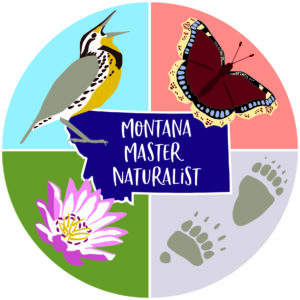


The goal of the Montana Master Naturalist Program is to increase natural history knowledge and promote awareness, understanding, and stewardship of Montana’s natural environment by developing a corps of well-informed citizens dedicated to conservation education and service within their communities. The core of this program is the Montana Master Naturalist Certification Course, which is approximately 45 hours of classroom and field time. The Montana Audubon Center is the home for this program in Billings and works with the Montana Natural History Center in Missoula to offer state-wide certification. Students who complete the course become certified as Montana Master Naturalists. To maintain their certification, Montana Master Naturalists are required to log 20 hours of volunteer service and participate in 8 hours of continuing education annually.
“The Master Naturalist class has truly enriched my life. I am more observant now than I ever was. How rewarding to know even more about the living things I share the environment with.” ~D.M., Billings Master Naturalist student 2018
“This was an excellent course. It left me wanting to learn even more, and gave me the resources to do so on my own.” ~M.H., Billings Master Naturalist student 2020
At this time we do not have plans to run the course in 2024. If you would like to be notified when we offer it next, please fill out this quick form- Montana Master Naturalist Interest Form.
For all other inquiries please email Emily Chilcoat at [email protected] or call us at 406-294-5099.
To maintain their certification, Master Naturalists are required to complete 20 hours of volunteer service and 8 hours of continuing education each calendar year.
If you need the password, please contact Christine Morris ([email protected]) at the Montana Natural History Center
Recertification Deadline: January 1. For example, if you graduated in 2020, your deadline is Jan. 1st, 2022.
Stay in the loop for continuing education & volunteer opportunities in the Billings area. Join the Master Naturalist graduate Google Group by contacting Emily Chilcoat, at [email protected]
The activity needs to:
Each volunteer service activity may fit under one of these categories: Citizen Science, Stewardship, Education, Organizational Support, Other.
Citizen Science involves volunteers assisting with scientific research. These projects usually involve gathering data and returning it to researchers. Examples include:
Stewardship includes natural resource management activities. Examples include:
Education includes the presentation and/or development of educational materials. Examples include:
Organizational Support projects include working to ensure the functioning of any conservation/environmental organizations. Examples include:
Other projects should be described when you submit hours
Montana Master Naturalist continuing education needs to:
Most activities will:
Examples include:
Where to find continuing education opportunities in the Billings’ area: